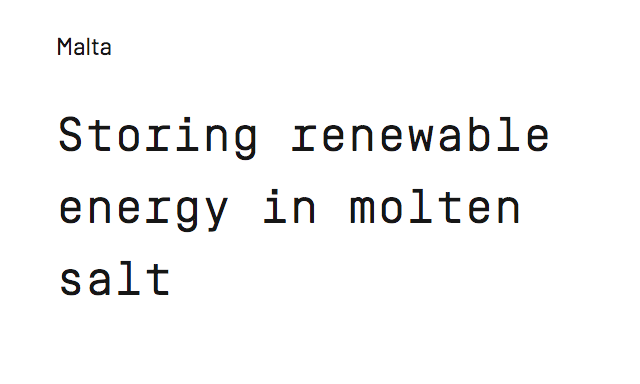by Mark Chediak and Mark Bergen, Bloomberg
Alphabet Inc.’s secretive X moonshot lab is spinning off an energy-storage project with backing from billionaires including Jeff Bezos and Bill Gates.
Malta Inc., the newly independent company, raised $26 million led by Breakthrough Energy Ventures LLC, a fund that counts Bezos, Masayoshi Son and Ray Dalio among its investors. Michael Bloomberg, majority owner of Bloomberg LP, the parent company of Bloomberg News, is also a Breakthrough investor and Gates is chairman.
Other Malta backers include Hong Kong-based Concord New Energy Group Ltd., a wind and solar power developer, and Alfa Laval AB, a Swedish industrial company, X said on Wednesday.
The money will help Malta further develop a system that uses large vats of molten salt and cooler liquid to store electricity generated from variable sources such as solar and wind. The startup likely will need additional funds to build a full facility, according to Chief Executive Officer Ramya Swaminathan.
“The challenge we have set for ourselves is to enter the age of storage with the next generation of technology,” said Swaminathan, who used to run Rye Development, a Boston-based developer of renewable energy projects.
Read more about how Malta’s technology works.cszdyseuuudcy
Storing electricity produced by intermittent sources is becoming a critical tool to reduce carbon emissions and combat global warming. California wants all its electricity to come from carbon-free sources by 2045. The state sees as much as 30 percent of its solar energy wasted during certain times of day, and a lack of storage options is a big part of that.
Malta’s system can be located almost anywhere, including near solar panel arrays and wind turbines, and it has the potential to last longer than lithium-ion batteries, Swaminathan said. The company would consider China among the possible places where it would locate a pilot project, she added.
Solar developers have tried using molten salt in other ways to store excess electricity, but full-scale applications remain limited. SaltX Technology Holding AB has developed a salt-based heating and cooling system.
Alphabet’s X was once home to all of Google’s free-wheeling experiments, incubating sci-fi projects like self-driving cars, delivery drones and the Google Glass wearable computer. Since 2015, when Alphabet was formed, the lab has trimmed project budgets and dialed back some of its ambitions.
Now X designs projects with two primary goals: to become a standalone Alphabet division or spin out into an independent company. Other options include shutting down or becoming part of Google. Alphabet once had far bigger plans around energy, but has trimmed those in favor of smaller efforts like Malta inside X. A geothermal project called Dandelion became a standalone startup in 2017.





